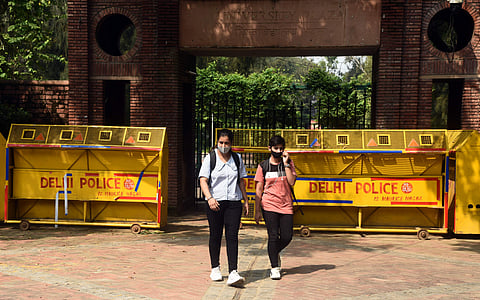

Delhi University's (DU) admission policy for the academic year 2022-2023 was released by Vice-Chancellor Yogesh Singh on Tuesday, April 5. He stated that it is on the basis of the Common University Entrance Test (CUET) marks that the eligibility will be decided.
Since CUET has been made compulsory for getting into 45 central universities in India, the admissions to DU will be held through CUET. It was till last year that admission to DU was done on the basis of cut-offs marks in Class XII Board exams.
Singh went on to call the new admission policy a landmark one and stated that admission to all UG programmes will be held through CUET, except for the School of Open Learning and the National Collegiate Women's Education Board.
The Vice-Chancellor also shared that after the CUET results are declared, during the e-counselling which will be conducted, 30 per cent more students than the seats allocated will be admitted so that even if there are cancellations, the seats will remain on par.
"It is mandatory for all candidates to appear in CUET 2022, including those seeking admission to supernumerary seats. The eligibility criteria will be decided on the basis of marks obtained in CUET," he said, as per a report in PTI.
For 50 per cent seats reserved for minority colleges, for admission, 85 per cent of the marks will be taken from CUET and the remaining 15 per cent will be decided by the colleges, informed Singh and added that, admissions to 50 per cent of the non-reserved seats will be only based on CUET.
Candidates will be able to appear for CUET only in those subjects which they have studied in their Class XII, said Haneet Gandhi, Dean (Admissions). When it comes to merit, it will also be calculated on the basis of the combination of only those subjects in which the candidate has appeared in the CUET, she shared.
Even those students who have gap year can apply for CUET and those who switch streams will face no disadvantage, she said.
CUET 2022 has three sections.
The first section is split into two parts. The first part has 13 languages and the second part has 20 languages. For admission to DU, it is compulsory for the candidate to appear in at least one language. As many as 27 topics that are specific to the domain will be a part of the second section of CUET. The third section will be about general knowledge and this is for admissions to BA programmes only, explained Gandi in detail.
For admissions to most DU programmes, the candidate will have to pick at least three subjects from section two, that is, the subjects which are specific to domains, she shared.
B1 and B2 — this is the classification of the second section. The candidates will have to pick and choose the subjects appropriately so that at a time, not more than one subject is selected.
When it comes to the eligibility for admissions to most BSc courses, it would be calculated on the basis of Physics, Chemistry, Mathematics or Biology.
In any one language in CUET, it is mandatory for students to score 30 per cent, Gandhi continued to explain.
When it comes to admissions to Bachelor of Arts, the aspirant will have to attempt the entrance test in any one language from section one and three from the other section. Merit will be calculated on the basis of marks that are scored by the candidate in the same subject and language.
For admission to BA (Hons) Economics, it is mandatory for the candidates to take the test in Mathematics in CUET. When it comes to the merit, it will be calculated on the basis of marks scored in the chosen language, Math plus any two subjects in CUET.
It is for a maximum of six subjects, out of which one surely needs to be a language subject, that an aspirant can appear for in CUET.
"Just like when we had cut-offs, we used to take best of four subject marks, similarly, here we will take into consideration the best score of CUET for admission to the Delhi University," she added.
BBA, BMS and BBE aspirants will need to appear for one language, Math and as per section three of the CUET. For BA, BVoc and BCom porgramme, candidates can choose a language along with one domain-specific subject and a general examination or a three-subject test.
Candidates can choose one language or take a test in any other language for admission to linguistic programmes.
"However, preference will be given to those appearing in the particular language. Centralised e-counselling will be done after the test," Gandhi said.
E-counselling will follow after CUET results are declared and on the basis of their marks, candidates can pick the college of their choice. Prior to each counselling, the candidates can re-fill their preferences, informed the DU VC.
Though things will be much more clear once the results of CUET are announced, it is likely that all three counselling rounds will be conducted, the third being a spot round, he said.
University's website, with illustrative examples, will be going live on Wednesday, April 6.
A DU official informed that for choosing universities and courses, CUET forms will have drop-down menus. The university will assist students during the counselling process in case they hadn't picked a course in the initial stage but hoped to study it now.
"There will be a provision of help desk to assist the candidates in the selection of question papers and open house and webinars will also be organised to help the candidates," he said.
